 Image credit: Unsplash
Image credit: UnsplashAbstract
Coronavirus is a type of RNA-positive single-stranded virus with an envelope, and the spines on its surface derived its official name. Seven human coronaviruses 229E, OC43, SARS, NL63, HKU1, MERS, SARS-CoV-2 can cause both a mild cold and an epidemic of large-scale deaths and injuries. Although their clinical manifestations and many other pathogens that cause human colds are similar, studying the relationship between their evolutionary history and the receptors that infect the host can provide important insights into the natural history of human epidemics in the past and future. In this review, we describe the basic virology of these seven coronaviruses, their partial genome characteristics, and emphasize the function of receptors. We summarize the current understanding of these viruses and discuss the potential host of wild animals of these coronaviruses and the origin of zoonotic diseases.